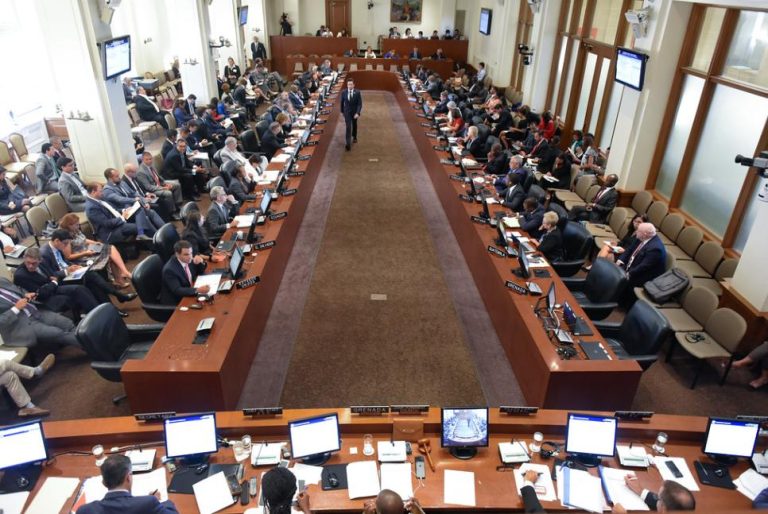14 de junio 2021

Children of Exile: The Births “Sowing Hope” in the Camp of Nicaraguan Farmers

PUBLICIDAD 1M
PUBLICIDAD 4D
PUBLICIDAD 5D
Former Ambassador Mauricio Diaz recalls how the FSLN turned to the OAS in June 1979, to achieve the condemnation and suspension of the Somoza tyranny

The former alternate ambassador to the Organization of American States (OAS), Mauricio Diaz, believes that the call made by the hemispheric organization to address the repression of the Ortega dictatorship in Nicaragua, evokes what happened between 1978 and 1979, when the organization asked the Somoza regime to leave power and the Sandinista Front thanked the diplomatic support and, indeed, was given a seat on the Permanent Council to expose Somoza’s abuses against the Nicaraguan people.
In an interview with journalist Carlos Fernando Chamorro on Confidencial Radio, broadcasted by Radio Corporacion, Díaz expressed that in the face of a possible scenario of suspension from the regional body, the response of the Ortega regime may be to declare a “diplomatic victory,” calling the probable resolution interference or as a retaliation for Nicaragua’s defense of its “sovereignty.”
The OAS Permanent Council convened an urgent session for this Tuesday June 15, to address the situation in Nicaragua, on which the organization’s Secretary General, Luis Almagro, warned of a breakdown of the constitutional order.
“Knowing the nature of the regime, a probable suspension resolution can be presented as a victory. It seems that Nicaragua is anchored in time. It seems that we have reached 1978-1979, that we are still trapped in that logic of war and confrontation, internal struggles and the lack of freedom by a regime that wants to deny us the right to vote,” said Diaz.
Between 1978 and 1979, the OAS became a solid diplomatic support for the Sandinista Front, in the context of the citizen insurrection against the Somoza dictatorship. The Sandinista Front resorted to the organization seeking a condemnation against the Anastasio Somoza Debayle regime.
“At that time, the OAS requested the immediate departure of the regime and to be replaced by what would become a National Reconstruction Governing Junta. That is why I said that it seems that we are anchored in that period, because we run the risk that we will return to a similar situation,” Diaz added.
In a session in June 1979, Panamanian foreign minister Antonio Tack ceded the seat of that country in the OAS so that the representative of the Sandinista Front, Miguel D’Escoto, could denounce the atrocities of the Somoza tyranny. Now, the diplomatic representatives of the Ortega regime accuse the body of being a tool of “imperialism” to “undermine independence and the free will of the people.”
“I am hopeful that the issue of the votes needed to approve article 21 of the OAS Democratic Charter will finally be surmounted. If the Secretary General decides to move on from the discussion to article 20 and approve 21, it is because he probably already has a qualified vote. Out of 34 member states, 23 are needed to be able to apply the articles that implies the suspension of a State, not the expulsion from the organization. It would be a suspention under the logic that it is a collective effort of the democracies of the continent, to prevent that Nicaragua from abandoning the fold of democracy,” Díaz explained.
Article 21 of the Inter-American Democratic Charter indicates that when the General Assembly, convened an extraordinary period of sessions, to ascertain if there was a breakdown of the democratic order in a member state and that diplomatic efforts have been fruitless, in accordance with the OAS Charter the decision to suspend such a State from the exercising its right to participate in the organization with the affirmative vote of two-thirds of the member states. Suspension shall take effect immediately.
Diaz said that the socio-political crisis caused by the repression unleashed by the dictatorship represents a great challenge to the functioning of the OAS, and particularly a test for the Secretary General Luis Almagro, who has been accused of not being firm with the abuses of the Ortega regime.
If the OAS fails to demonstrate that it is useful in this crisis, I believe its days are numbered. This is an important moment of Secretary Almagro and the organization to show the goals for which it was created.
There is a risk that Nicaragua will become the new Cuba of the 21st Century. At this time, what corresponds to the Secretary General and the organization itself are actions. The time of diplomatic negotiations in good faith and the so-called vehement calls is over,” he affirmed.
Regarding the support of the Central American countries for suspension, former Ambassador Diaz explained that the backing of Costa Rica, Guatemala, Belize and Panama is expected. “The big question is going to be how the vote of the El Salvador government of Nayib Bukele will react and I think that the Honduran Government is going to lean in favor of the dictatorship,” he noted.
But the great dilemma in the face of this transcendental vote that Nicaragua faces is the votes of the islands nestled in the Latin American Caribbean. “I think there is a change in the correlation of forces, mainly in the Caribbean countries. When Somoza fell, the 14 Caribbean states were not in the OAS and it was the United States that requested the incorporation of the island states. These countries have been a problem for democracies, due to their alignment with the Chavez regime for their dependence on Venezuelan oil. But it seems that Great Britain is exercising an important leadership within these states, and it will probably be possible to achieve a qualified majority,” explained Diaz.
This article was originally published in Spanish in Confidencial and translated by Havana Times
Archivado como:
PUBLICIDAD 3M
PUBLICIDAD 3D